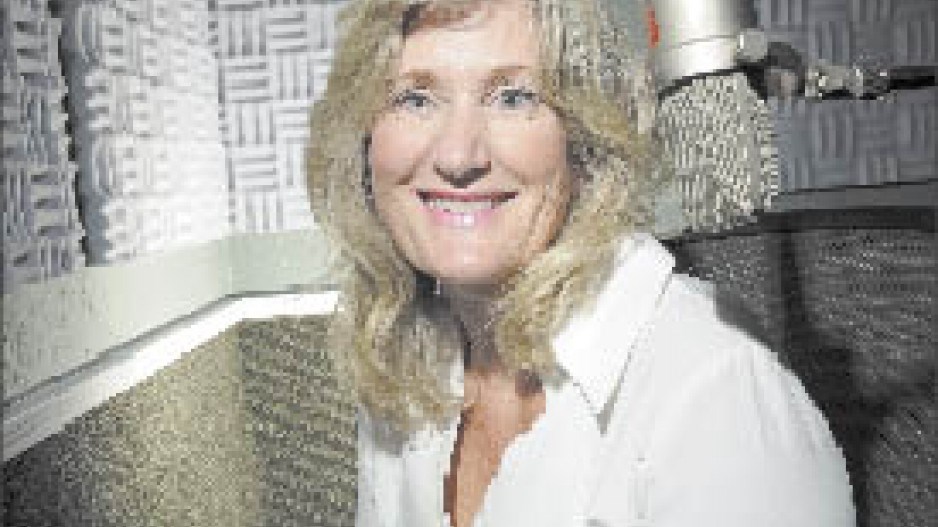When U.S. President Barack Obama signed legislation last fall requiring American broadcasters to make some of their their TV programming accessible to the blind as of July 2012, a Vancouver CEO knew she needed to launch her company into the U.S. market.
“I think that the [market] growth opportunity there is phenomenal,” said Diane Johnson, president and CEO of Descriptive Video Works.
Johnson’s eight-year-old company leads the Canadian market for described video.
“As a blind person, you’d hear a gun shot [on TV] and you go, ‘Who is it? Who got shot?’ and unless somebody was sitting there telling you what was going on, you wouldn’t understand the plot,” Johnson said.
Descriptive Video Works scripts and records audio tracks that describe scenes and body language that aren’t conveyed by dialogue.
In Canada, major broadcasters have been required to provide four hours a week of described video programming since 2003. This month, those requirements were extended to Canadian specialty channel broadcasters, such as History Television.
But Obama’s passing of the 21st Century Communications and Video Accessibility Act convinced Johnson her company’s real growth opportunities are south of the border.
And she isn’t the only one looking for a toehold in the U.S. market.
“I’d say we get at least a couple of clients a week that certainly have some aspirations [to enter the U.S. market],” said Richard Sagan, a client services co-ordinator for Small Business BC (SBBC). “The opportunity can be immense.”
Sagan said he’s currently seeing the highest interest from manufacturing and consulting firms. He noted the companies have a number of options for setting up across the border, including setting up distribution for manufactured goods, finding a U.S. agent to drive sales or setting up a full office.
He said a first step for businesses setting up in the U.S. market is to visit the US Small Business Administration website (www.sba.gov).
The site, he notes, walks owners through steps such as registering a business name, getting a tax identification number, registering for state and local taxes and obtaining business licences and permits.
A second resource, he said, is small-business development centres that have been set up in different states; he recommended that B.C. business owners contact the centre closest to where they’d like to set up shop.
For Johnson, the key to figuring out how to open an L.A. office – which she launched in March – was finding an American entertainment lawyer who had previously helped other Canadian companies incorporate in the States.
“I think that was part of the key to it – getting the right person who knew the right answers instead of having to ask 15 people.”
After sorting out the legal requirements and incorporating in the U.S., Johnson tracked down L.A.-based Mhairi Morrison to run the new office. Morrison, Johnson said, had the necessary background, connections to the L.A. film community, and a U.S. work permit.
In Morrison, Johnson sidestepped one key challenge for Canadian companies: work permits.
Both Sagan and Corinne Pohlmann, vice-president of national affairs for the Canadian Federation of Independent Business, cautioned that getting work permits for Canadians can be tricky for Canadian businesses setting up – or even working short term – in the U.S.
Polmann said a number of CFIB members have even been having trouble getting the necessary permits to send Canadian workers on short-term stints to the States, to train or carry out repairs.
“They struggle to get those people across the border to help their clients,” she said. “Especially in the last couple of years with the recession and the downturn, the Americans are much more conscious of, ‘Well, why don’t you hire an American to do it?’”
Permits aside, Johnson is facing a more basic challenge: will her financial gamble on the L.A. office pay off? To date, she said, the office has resulted in a number of “amazing” meetings with decision-makers at U.S. broadcasters – but no sales.
Already, she said, she’s been disappointed to see the recently launched Oprah Winfrey Network – which she considers to be a perfect ethical fit for described video – fail to respond to her company’s offerings.
“[O Network representatives] said, ‘We don’t think that we have to do it. We’ve got our lawyers working on it now and we don’t think we have to,’” Johnson said.
But she added that her faith in the L.A. office is strong.
“I think it will at least double our business in the next two years.” •




